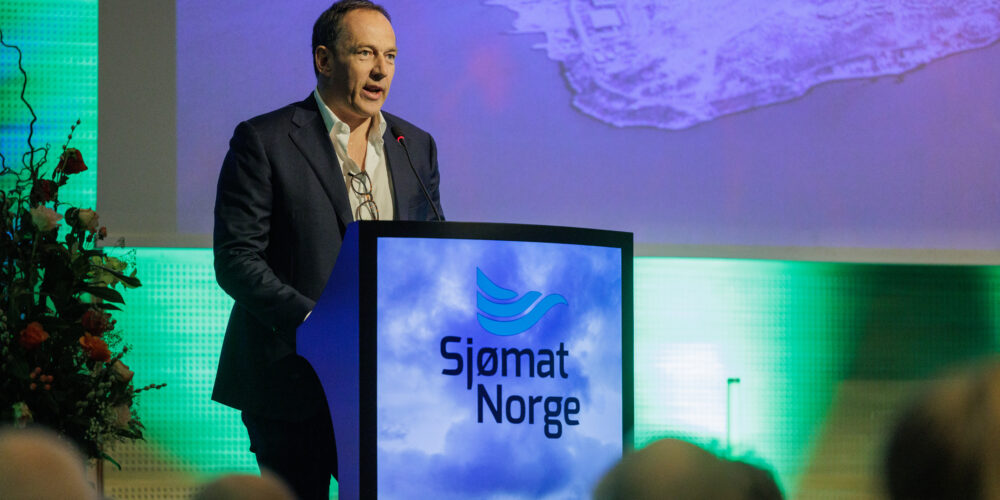Aquaculture and fishing must live with criticism, says seafood chief

Both the aquaculture and fishing industries must learn to accept increased scrutiny, the Chairman of the employer organisation Seafood Norway has said.
Gunnar Haagensen told the organisation’s annual meeting: “We have to learn to live with that. Challenges must be met, problems solved.”
Haagensen pointed out: “Over the past six months or so, the seafood industry, and especially the aquaculture industry, has been challenged by a number of negative media reports.
“It has challenged both companies and organizations in the industry and means that we have to ask ourselves a number of key questions.”
Haagensen asked: “How are we perceived? Do most people accept how we conduct our business? Do people think we are doing our best.
“We would like to see the whole of Norway proud of our industry, but then we must not disappoint when the story of our industry is to be told.
Haagensen pointed out that the industry in Norway is in a unique position, as the world’s largest seafood exporter, the country’s second largest export industry and the country’s most important district industry, which produces healthy food with a low climate footprint, without subsidies and creates large ripple effects.
“We have almost all global megatrends behind us, but we are completely dependent on the people’s acceptance and political will to prioritise and act in order to realize the potential the industry has.”
The Chairman highlighted the fight over the concept of food as important going forward and believed that it has long been the case that “food is agriculture and fish is industry”. We have to turn this around, said Haagensen, because seafood is healthy food, health policy and preparedness policy.
“We are food producers and in a state of emergency can supply the whole of Norway with healthy and nutritious food. Seafood must be included in the concept of food and food policy in Norway,” he added.
He also pointed to the importance of a trade policy that benefits the whole country and highlighted the importance of reducing customs barriers and trade barriers, and he also addressed how the government’s tax policy has led to lower investment and less innovation.
Both the aquaculture and fishing industries must learn to live with increased scrutiny, the Chairman of the employer organisation Seafood Norway has said.
Gunnar Haagensen told the organisation’s annual meeting: “We have to learn to live with that. Challenges must be met, problems solved.”
Haagensen pointed out: “Over the past six months or so, the seafood industry, and especially the aquaculture industry, has been challenged by a number of negative media reports.
“It has challenged both companies and organizations in the industry and means that we have to ask ourselves a number of key questions.”
Haagensen asked: “How are we perceived? Do most people accept how we conduct our business? Do people think we are doing our best.
“We would like to see the whole of Norway proud of our industry, but then we must not disappoint when the story of our industry is to be told.
A unique position
Haagensen pointed out that the industry in Norway is in a unique position, as the world’s largest seafood exporter, the country’s second largest export industry and the country’s most important district industry, which produces healthy food with a low climate footprint, without subsidies and creates large ripple effects.
“We have almost all global megatrends behind us, but we are completely dependent on the people’s acceptance and political will to prioritise and act in order to realize the potential the industry has.”
The Chairman highlighted the fight over the concept of food as important going forward and believed that it has long been the case that “food is agriculture and fish is industry”. We have to turn this around, said Haagensen, because seafood is healthy food, health policy and preparedness policy.
“We are food producers and in a state of emergency can supply the whole of Norway with healthy and nutritious food. Seafood must be included in the concept of food and food policy in Norway,” he added.
He also pointed to the importance of a trade policy that benefits the whole country and highlighted the importance of reducing customs barriers and trade barriers, and he also addressed how the government’s tax policy has led to lower investment and less innovation.
The annual meeting also saw the election of the new board of Seafood Norway, including five new members:
- Gunnar Haagensen, Jangaard Export AS – re-election
- Line Ellingsen, Ellingsen Seafood AS – re-election, new 1st deputy chairman
- Guri Lerøy Riple, Marine Constructions AS – re-election
- Øyvind Oaland, MOWI ASA – re-election
- Helge Singelstad, Lerøy Norway Seafoods AS – re-election
- Gustav Witzøe, Salmar ASA – re-election
- Andreas Kvame, Grieg Seafood ASA – re-election
- Ida Holmøy, Eidsfjord Sjøfarm AS – re-election
- Gunnar Domstein, Domstein Sjømat AS – new election, new 2nd deputy chairman
- Marianne Bendiksen, Northern Light Salmon AS – new election
- 1st deputy Tor Anders Elvegård, Nordlaks Oppdrett AS – new election
- 2nd deputy Lucie Kathrine Sunde-Eidem, Scale Aquaculture AS – new election
- 3rd deputy Egil Johansen, Nord Senja Fisk AS – new election

